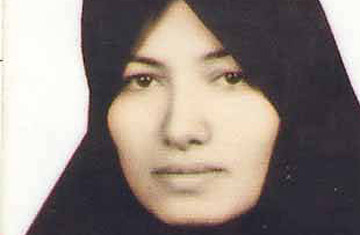
Sakineh Mohammadi Ashtiani
Iran's hard-line government holds fast to the belief that relenting under international pressure is a great blunder because, ultimately, it just invites more pressure. But, apparently, there are exceptions to the rule. In the face of mounting global outrage, Tehran said on Thursday that it would commute the stoning verdict of Sakineh Mohammadi Ashtiani, a 43-year-old woman convicted of adultery. The government delivered the news through its embassy in the United Kingdom, where the media first highlighted the case and sparked an international campaign that has resonated from Hollywood to Brazil. "There are forces within the Islamic Republic who want to do away with stoning," says Shadi Sadr, a prominent human rights lawyer who has worked on stoning cases in the past. "They don't think it's worth sullying Iran's international reputation for the sake of a handful of adulterers."
In the first comment to emerge from Tehran about the case, Mohammad Javad Larijani, the head of the Iranian judiciary's human rights council, said Friday that Ashtiani's sentence is under review. "Our justice system will not change its course due to a media attack," he told the Islamic Republic News Agency, invoking various internal reasons for the change in course.
The judiciary in Tehran has yet to confirm the commuting of Ashtiani's verdict, and her lawyer has received no official indication, according to Hadi Ghaemi, of the International Campaign for Human Rights in Iran. It also remains unclear whether Ashtiani will be executed by other means. In 2006, a court in the north-eastern province of Azerbaijan first convicted the widow of "illicit relationships." As punishment she received 99 lashes in the presence of her teenage son. Short months later, a separate court charged her with adultery committed during the time of her marraige — and sentenced her to death by stoning.
Iran's penal code, which interprets Islamic law with exceptional severity, stipulates death by stoning for both men and women in cases of adultery. Article 104 of the code even specifies that "the stones should not be so large that the person dies upon being hit by one or two of them; neither should they be so small they could not be defined as stones."
Ashtiani's case is no anomaly. Iran is meting out the death penalty more aggressively than ever before, and has executed over 100 people this year alone. But the timing of her announced execution was striking. Just a month after the United Nations Security Council passed a fresh round of sanctions against Iran, the news seemed to signal Tehran's indifference to mounting international pressure over its nuclear program and deteriorating human rights record. Officials are well-aware of stoning's unique ability to generate global revulsion: an internal debate about how punishments like stoning undermine Iran's reputation in the world has figured among Iran's elite political circles for at least two decades. The move to stone Ashtiani suggested, however, that radicals within the system were seeking confrontation with the West. "They want to say that they can do what they want, that they are not afraid of the West's criticism and do not care," says Muhammad Sahimi, a professor at the University of Southern California who closely monitors Iranian politics.
Pragmatists throughout the Iranian establishment, including prominent conservatives, recognize that such punishments not only tarnish the country's human rights records, but arm the West with tangible complaints to raise at the negotiating table. "The Iranians were frustrated that they were losing points for behavior they could easily change and didn't view as strategic priority," says a European diplomat present at Iran's negotiations with Europe during the first term of president Mohammad Khatami, a time when Tehran was keen to engage with the West.
That awareness led the chief of Iran's judiciary, Mahmoud Hashemi Shahroudi, to impose a moratorium on stoning in 2002. But the moratorium never translated into a formal amendment of the penal code, and human rights observes complained that Shahroudi was only placating global public opinion. "Iran has never properly done away with stoning," says Shirin Ebadi, a Nobel Peace laureate and Iran's most prominent human rights defender. "It has always been on the books and carried out quietly. If the government truly intended to deal with stoning, it would have changed the law itself."
While many hard-line judge and clerics in Iran cling to the harsh implementation of Islamic law, a prominent clique of more moderate jurists argue that the Koran itself does not command stoning for adultery, and that there is room within the law to retire the punishment. Moderate clerics have invoked Ayatollah Khomeini himself when making their case, noting that Khomeini made a distinction between Islamic teachings that were immutable, and "secondary" principles that could be modified or suspended according to the changing needs of society. As a punishment with origins in the hadith, or the records of the Prophet Mohammad's sayings and practices outside of the Koran, stoning belongs to the second of Khomeini's categories and could be easily dispensed with, even by Iran's Islamic government. Key Iranian reformists have made this point in the past, particularly the journalist Abbas Abdi, who has published an account of Khomeini instructing Iran's judges to either refrain from handing down stoning verdicts, or at the very least, to hold stonings away from the public eye. Khomeini's justification, in Abdi's account, was that stoning provided ammunition to Iranian opposition groups in the West.
The international campaign to stay Ashtiani's execution continues to gain momentum despite news of the reprieve, led by her son Sajad, 22, and daughter Farideh, 17. "Of course it would be in Iran's interests not to implement this execution and refrain from provoking the international community," says Ebadi. "But the group that's in power today doesn't have Iran's interest at heart."
